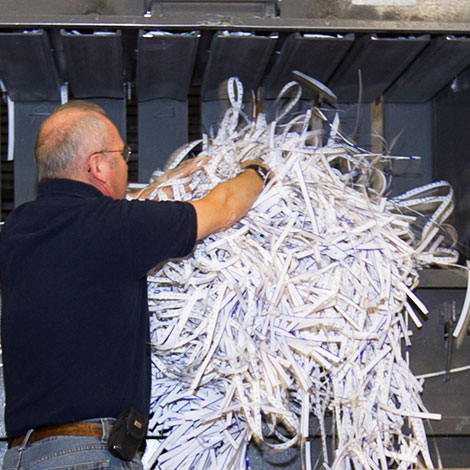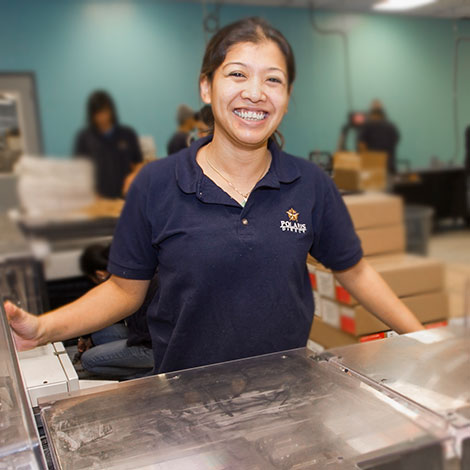In the business world, “Leave your personal life at home” is a common mantra. But Polaris Direct GM of Client Services Jodi Mackie believes that it’s important to blend the personal with the professional. Read on for more of Mackie’s insights.
Believe it or not, we are not always capable of leaving our personal lives at home—the stress and challenges we face in our everyday lives come with us when we walk through the door in the morning. But I have found that one of the keys to a productive work environment is learning creative ways to embrace those challenges.
As a customer service manager, my personal experiences have directly contributed to my success.
In my “spare time,” I enjoy working with animals in need and have two rescue dogs. One, my family and I adopted very much on purpose (her name is Lucy) and the other we lovingly refer to as our “Failed Foster” (Abby).
We adopted Abby after fostering her for three months, working to facilitate her adoption into a new family, and three months later seeing her surrendered a second time. Abby faced a myriad of challenges, and when she entered our home again, I rededicated myself to studying her needs and doing all I could to help her have the best experience. I wanted to help her, train her to be successful.
It didn’t take long to see the parallels to my work life, as I also want my team to be successful despite the challenges that they will undoubtedly face. While not necessarily business related, the experience of fostering a dog like Abby has made me a better manager—a perk I had not counted on.
It has taught me to:
- Listen to the things they’re not saying.
Foster and rescue animals are often unsure of their place in their new homes. The task of carving out their own space can be daunting for them, and to top it off, they can’t actually tell you what they’re going through. You have to read it in their posture, their eye contact (or lack thereof), their demeanor and behavior; you have to listen to the things they’re not saying.
Similarly, many new employees (and sometimes even veteran employees facing new situations) struggle with change, are shy meeting new people, and feel unsure of their footing.
Like Abby, new employees often don’t tell you when they are experiencing anxiety and stress, but both are very detrimental to productivity and health. Thus, I try to always be on the lookout for indicators of stress and anxiety. Simply offering a hand in getting past those tough days can help create a more productive and enjoyable work environment.
- Share a piece of yourself.
Participating in a foster program means that you will inevitably experience a little bit of heartbreak every time one of your foster friends finds its forever home. To foster, you have to share a piece of yourself.
This, too, runs parallel to my team management approach. Productivity and work focus are of paramount importance, but the bonds that are formed around the water cooler and in the hallways can facilitate business objectives, too.
When challenges arise, co-workers who talk with one another about their kids, pets, hobbies, and what they did on Saturday night will work better together and in a more cooperative manner than those who do not.
My recommendation: when you get to that meeting a few minutes early, ask others about their weekend plans or how their kids’ games went the day before.
To be effective, however, sharing has to be genuine. It’s certainly okay not to share, but if it works for you and it’s genuine, go for it! It’s worth the quick wade through the discomfort of putting yourself out there; plus, it’s good for your health!
- Treat others as you’d want to be treated.
Everybody makes mistakes and a new foster pup is bound to make a few extra ones. While they want to be a productive member of your family—your pack, if you will—they have to get there by trial and error, and they need your support to do it.
Similarly, we try to create a supportive environment for our employees, knowing that an employee who feels supported in tough times will flourish in good times. We’ve found that it’s a major part of our success as a company. Like that foster pup, our teams want to do their best—and in most cases, they deliver in abundance. But as leaders, it is our job to monitor quality and performance and readjust our strategies as needed. Sometimes, it requires a bit of retraining and patience, but it’s well worth it in the long run—it leads to better communication, better practices, and better client support!
In conclusion, don’t be afraid to bring some of your life experiences to work—sometimes the best classes in management are the ones you take from your everyday life pursuits.
About the author: Jodi Mackie is General Manager of Client Services at Polaris Direct, a nationally acclaimed high-volume direct marketing services company in Hooksett, NH.

